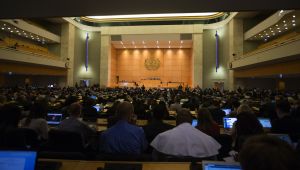As preparation for war against Iraq intensifies, the time has come to pause and consider the view from Baghdad. Conclusions from such an exercise are not comforting. But to strike without thinking seriously about what Saddam Hussein could do to us would be irresponsible.
Recent leaks of Pentagon plans reflect growing realism. Advocates' earlier claims about easy military options have given way to seriousness about a military campaign that could require 250,000 American troops. As the chairman of the Joint Chiefs of Staff, Air Force Gen. Richard B. Myers stated pointedly: "You just can't overlay Afghanistan . . . onto Iraq, and I would never refer to it as a cakewalk."
Congressional leaders from both parties now call on the administration to explain to Americans how it proposes to end Hussein's regime, at what costs in American blood and treasure and at what risk. In this debate, the most difficult challenge will be to "red team" Hussein: to put ourselves in his shoes and consider his possible countermoves.
The Bush administration's chosen strategy has forfeited the advantage of strategic, or even tactical, surprise. Clearly he knows we're coming. Evidently, he is actively considering what he can do to defer, deter or even prevail in the coming confrontation. His toolbox includes diplomacy, distraction, deterrence and, ultimately, massive retaliation.
Hussein's opening diplomatic gambits have been deft: settling outstanding territorial disputes with Kuwait; winning Arab League support for the proposition that an attack on Iraq constitutes an attack on all Arab states; dangling lucrative contracts before Russia and France; spooking Saudi Arabia so thoroughly that U.S. planners are now developing a war plan without use of Saudi bases.
As the United States has sought to enlist essential support in the region, the array of roadblocks and distractions expands. The list includes more than a dozen attempted terrorist assaults since 9/11; a sharp increase in suicide bombings in the second Palestinian intifada; terrorist attacks that have pushed India and Pakistan to the nuclear brink; and the collapse of the government of Turkey's prime minister, Bulent Ecevit. Given Hussein's modus operandi, which has included an attempt to assassinate the first President George Bush in 1993 and payment of $25,000 awards to families of Palestinian suicide bombers, we should expect him to continue fueling fires that could stand between the United States and war on Iraq.
Beyond diplomacy and distraction lies the murkier realm of deterrence, including a credible threat of massive retaliation. The most unrecognized, uncomfortable but brute fact is that today, Hussein already has weapons of mass destruction. The final report of U.N. inspectors in 1999 concluded that Iraq possesses significant stockpiles of biological and chemical weapons. A recently circulated CIA analysis puts Iraq's anthrax supply at 2,650 gallons.
In the first Gulf War, Hussein's forces loaded chemical and biological warheads on Scud and other launchers capable of reaching U.S. bases in Saudi Arabia, as well as Israel. In that war, the United States effectively deterred Hussein from using his weapons of mass destruction by threatening unlimited retaliation that would destroy his regime.
But what about this time? The announced objective of the impending campaign is to eliminate Hussein and his regime. Having announced one's intention to destroy an enemy and everything he holds dear, how can one then deter him from a Samson moment?
As President Bush rightly noted: "A nightmare scenario would be if a terrorist organization such as al Qaeda were to link up with a barbaric regime such as Iraq and thereby, in essence, possess weapons of mass destruction. We cannot allow that to happen." But the course of action Bush has chosen is in fact increasing Hussein's incentive to take just such an action.
Hussein has aircraft and missiles capable of delivering chemical and biological weapons against U.S. troops, bases and allies. Moreover, he has watched Osama bin Laden take a page out of a Tom Clancy thriller, using jumbo jets as guided missiles to assault America. In Clancy's "Executive Orders," an anti-American Arab nation slip canisters of biological weapons into the United States, where agents unleash these deadly bugs in crowded convention centers.
Imagine, God forbid, that as the United States builds up an invasion force in the Persian Gulf, Hussein sends a secret letter to President Bush informing him that he has placed biological weapons in New York, Washington and several other U.S. cities. Where would the confrontation go from there?
Before choosing war, the administration has an obligation to make the case that the proposed military campaign to topple Hussein really is the worst possible option -- except for all the others.
Allison, Graham. “The View From Baghdad.” The Washington Post, July 31, 2002




